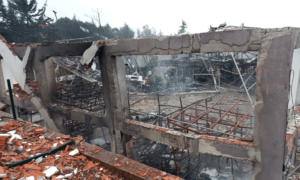• Draft amendment proposes Digital Rights Protection Authority to hold social media firms to account
• Definition of social media expanded to include tools used to access it, potentially bringing VPNs into ambit
• Sharing ‘fake news’ to be unbailable offence, punishable by 5 years in jail
ISLAMABAD: The government is planning ‘wholesale’ changes to the Prevention of Electronic Crimes Act (Peca) 2016, which would see the formation of a new authority, with powers to block online content and access to social media, as well as prosecuting those propagating “fake news”.
A draft of the ‘Prevention of Electronic Crimes (Amendment) Act, 2024’, seen by Dawn, proposes the formation of a Digital Rights Protection Authority (DRPA) to deal with issues such as the removal of online content, prosecuting people for sharing or accessing prohibited content and action against social media platforms where such content is hosted.
The amendments were confirmed by the prime minister’s adviser, Barrister Aqeel Malik, who said the new provisions were aimed at “eliminating misinformation and negative propaganda”.
Among the changes proposed in the draft amendment, the most notable is the new definition of “social media platform”, which has been expanded to now include tools and software used to access social media.
The draft proposes a new clause in Section 2 of Peca — which contains definitions of terms mentioned in the law.
“Any person managing a system that allows access to social media” has also been incorporated into the new definition.
Another addition to this definition is of “website”, “application”, or “communication channel” that allow people to access social media and post content.
This expanded definition could allow the government to block or restrict the use of Virtual Private Networks (VPNs) as they are used to access social media services, like X, which are blocked in Pakistan.
The government had earlier planned to register VPNs and block unregistered proxies, but the move was shelved after legal advisors pointed out that these were tools to access content, and not the content itself. Hence, the authorities had no legal grounds to block them.
New authority
Under the amended law, the government would set up the DRPA, a new body to take up the powers currently exercised by the Pakistan Telecommunication Authority (PTA) under Peca.
The authority would advise federal and provincial governments on “digital ethics and related fields”, promote education and research, incentivise and facilitate social media platforms and ensure the safety of users from harm online.
The DRPA would also “regulate” social media content, investigate complaints of violation of this Act and order authorities to “block” or restrict access to content.
The DRPA would also outline time frames for social media companies to implement its orders and make provisions for these platforms to have offices or representatives in Pakistan.
The process of setting up DRPA started after the PML-N-led government took power following the February 8 general elections.
In May, Prime Minister Shehbaz Sharif constituted a committee headed by his adviser, Rana Sanaullah, to build consensus on a draft for the proposed DRPA.
The matter was shelved, according to Information Minister Attaullah Tarar, who told VOA Urdu in September that the federal cabinet wanted discussions with stakeholders, including media houses, journalists’ bodies and political parties.
However, it is unclear whether any stakeholder discussions have taken place since then, or not.
Now, it has been proposed that DRPA will have a chairperson and six other members, including three ‘ex officio’ members.
The federal government would appoint the chairperson and three full members for three years, with a possible re-appointment for a term of equal duration.
The ‘ex-officio’ members will be secretaries of information and IT ministries and PTA chairman.
As per the draft amendments, all decisions of the DRPA would be made with the agreement of the majority members, but in case of any urgent matter, the chairperson will have exclusive powers to issue directives for blocking any unlawful online content.
The chairperson’s decision will have to be “ratified” by the authority within 48 hours.
‘Unlawful’ content
The DRPA will have the power to “enlist” social media platforms to abide by its rules and set conditions for them “in addition to the requirements of this [law]”.
The authority can ask the government and social media companies to block or remove unlawful online content.
The definition of unlawful content has also been considerably expanded in the draft amendment.
In its existing form, Peca defines “unlawful online content” — in Section 37 — as: “… [content against the] glory of Islam or the integrity, security or defence of Pakistan or … public order, decency or morality, or in relation to contempt of court or commission or incitement to an offence under this Act.”
The amended draft lists at least 16 types of content, which would be deemed unlawful.
These include blasphemous content; incitement of violence and sectarian hatred; obscene or pornographic material; copyright violation; abetment of crime or terrorism; “fake or false” reports; “aspersion” against constitutional institutions and their officers, including judiciary or armed forces; blackmail; and defamation etc.
‘Fake news’
The draft amendments also propose to add a new provision — Section 26(A) — to Peca to penalise perpetrators of “fake news” online.
It states that any person who “intentionally” posts any information “which he knows or has reason to believe to be false or fake and likely to cause or create a sense of fear, panic or disorder or unrest” shall be punished with imprisonment which may extend to five years or with fine which may extend to one million rupees or with both.
There are no details as to what would constitute “fake or false information”.
Dawn understands that PPP, one of the parties in the ruling coalition, is opposed to the proposal of a five-year prison term. A party leader told DawnNewsTV that they have suggested three years’ imprisonment instead.
Another amendment to subsection a Section 43 of Peca would make would make offences under Section 26(A) non-bailable, non-compoundable and cognisable.
Under the rules, which would be drafted after these amendments become law, a tribunal will be set up to prosecute people for offences outlined in the Act.
A high court judge, or a person qualified for that post, would head the tribunal, whose members would be a journalist and a software engineer.
Abdul Moiz Malik in Karachi also contributed to this report
Published in Dawn, December 3rd, 2024







